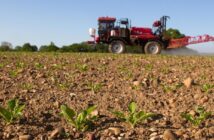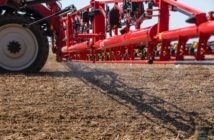The authorities have granted a further approval to use Asulam to control bracken during the 2022 season.
Asulam is currently the most important herbicide for the control bracken, and it is marketed by UPL as Asulox.
Control of bracken is important to maintain biodiversity, avoid the loss of open land for grazing, reduce impacts on open access, keep a diverse landscape and reduce the amount of habitat that is favourable to sheep ticks.
The litter from dead bracken plants provides an ideal breeding location for sheep ticks, which spread diseases that are a threat to humans, livestock and wildlife.
Simon Thorp, coordinator of the Bracken Control Group (BCG), stated that: “The aim is to control bracken, not completely eradicate it. As described in the notes, there are many different control techniques from hand-pulling individual fronds to spraying herbicide from a helicopter.
“As Asulam offers the unique properties of selective control and approval for aerial application, its use has been the preferred herbicide control option since it was introduced in the late 1960’s. These properties make it a very important part of bracken control, especially for large areas, or in places where access by ground-based machinery is difficult or impossible.”
EAMU
Recently, Asulam has only been available under the terms of a series of annual Emergency Authorisations, which have been granted for the whole of the UK by the Chemicals Regulation Division (CRD) of the Health & Safety Executive (HSE) in response to an application submitted by the BCG.
The approval granted for the 2022 control season authorises application of asulam from 1st July until 12th September. To allow time for the disposal of stocks, the approval to store and transfer the product does not expire until 28th October.
Full details of the revised approval have been published on the BCG’s website, and it is essential that anyone planning to apply Asulam for bracken control reads and fully understands all the conditions. If there are any queries, there is a contact form on the BCG website.
Mr Thorp pointed out that the annual nature of the emergency authorisations involves an enormous amount of effort by the authorities and the BCG, and the reliance on this process has introduced a lot of uncertainty within the bracken control industry . This includes: UPL, the distributors, the government agencies, the contractors and the end-users of the product. As a result, the amount of investment in the product, training and equipment has been reduced and the only winner is bracken. The BCG is seeking a more sustainable approach to bracken control that moves on from the annual authorisations. A discussion with all UK administrations is being sought to consider the development of a more effective and efficient approach.




